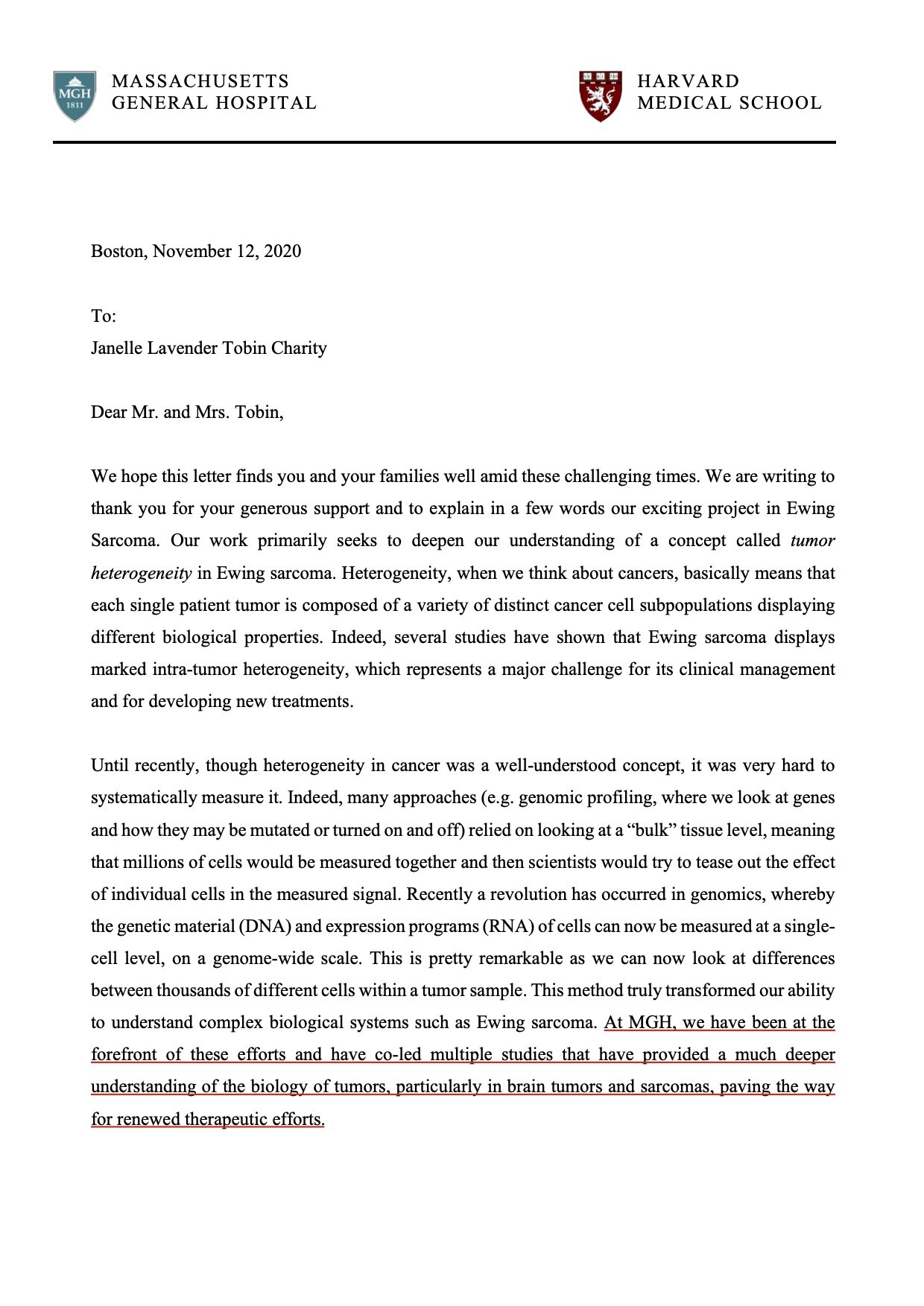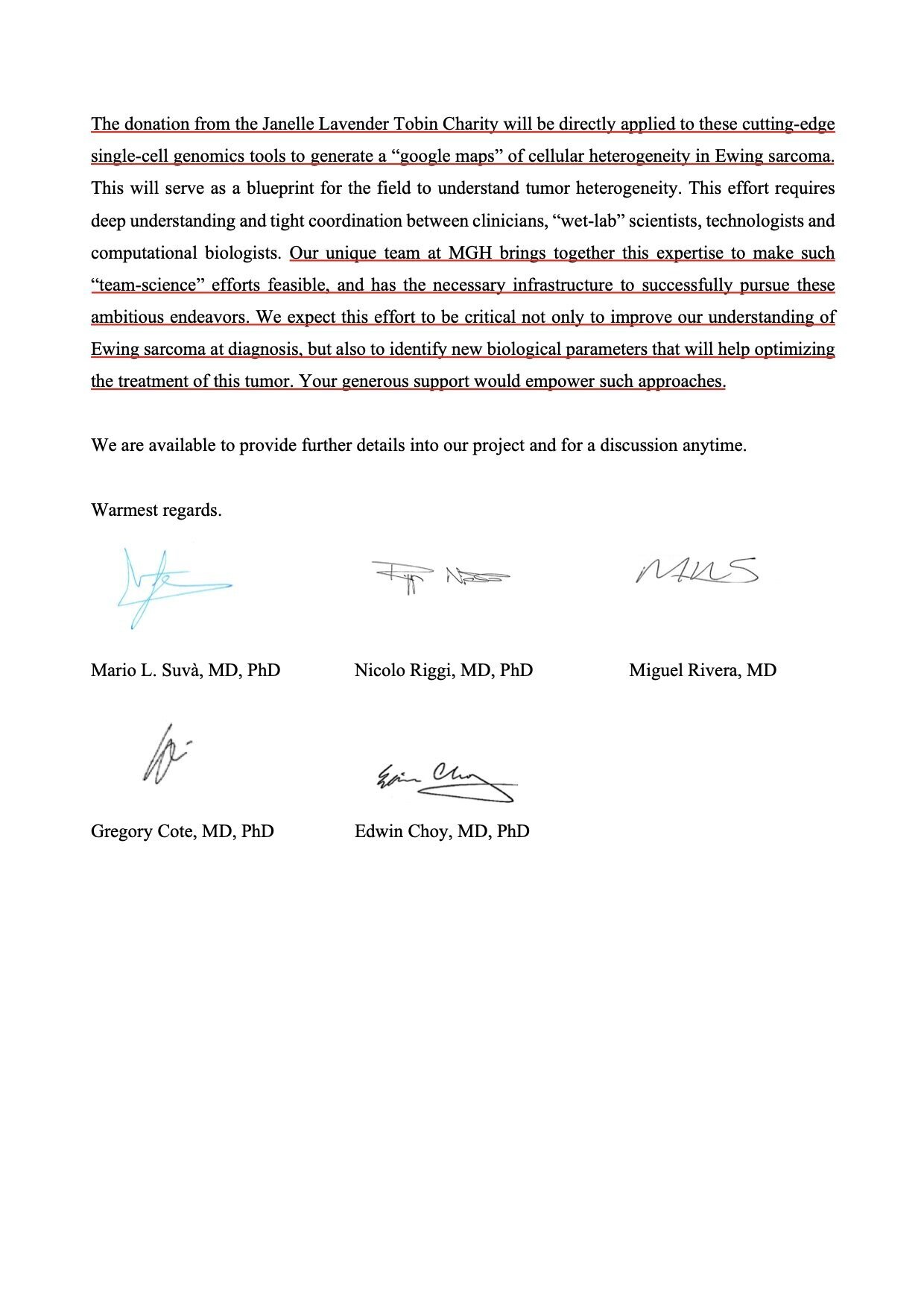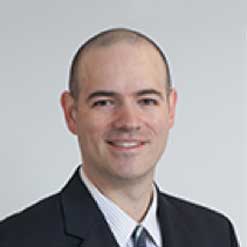Research
Donate directly to Ewing Sarcoma Research at Massachusetts General Hospital
Click the button below and check the box for “I’d like to designate this gift to a specific area” and enter “Ewing Sarcoma Research.”


Developing New Treatment Strategies in Ewing Sarcoma May 2019
Ewing sarcoma is the second most common pediatric bone tumor. Despite intense treatment regimens – which include a combination of surgery, chemotherapy and radiation – rates of recurrence and mortality for patients with this disease are high. There is thus a pressing need to develop new targeted therapies for Ewing sarcoma. Researchers at the Massachusetts General Hospital Cancer Center are leading the way to find new treatments for this difficult disease, focusing on an improved understanding of the mechanisms that drive the growth and survival of tumor cells.
The genetic information of a normal or cancer cell is encoded in DNA, which is packaged into long strands called chromosomes that contain genes. The field of epigeneticsfocuses on the precise mechanisms that turn specific genes on or off to carry out various functions. If you conceptualize a cell’s DNA like a book with instructions for each cell in the body – where each sentence, page, or chapter carries genetic information and cell programs – the epigenetic processes direct the reader to specific parts, while the rest of the book is hidden from view. For example, parts of chapters 1, 3-8, 10 and 12 may be available for you to read, but the rest are concealed, as if they are not there. These programs can be changed in the right situation, where the missing chapters are unmasked and are made available to read. In Ewing sarcoma there is an abnormal protein called EWS-FLI1. This protein has been shown to turn on or off thousands of gene targets to, in a sense, reprogram the cell (or book in our example) into a cancer cell. If you take away EWS-FLI1 in experiments in the lab, the cells die or revert to their old program.
This process of turning on different parts of the book relies on regulatory elements, which act as bookmarks that connect to specific genes. Interestingly, it is now recognized that DNA forms 3D structures and loops to bring regulatory elements close to genes. In the book analogy, parts from chapter 20 could wrap around to chapter 5 to control how chapter 5 functions.
The Mass General Cancer Center has been at the forefront of research in Ewing sarcoma through the combined efforts of basic, translational and clinical investigators. Miguel Rivera, MD and Gregory Cote, MD, PhD are working on several different research projects to advance our understanding of and treatments for Ewing sarcoma.Recently, research from the Rivera laboratory has shown that the EWS-FLI1 protein operates as a major regulator of the epigenetic states described above, which determine whether genes are turned on or off. Moreover, the Rivera laboratory has also shown that these properties are dependent on a prion-like segment of the fusion protein, a discovery that sheds light on the mechanism of action of this oncogene and opens opportunities for developing new therapies. Researchers at the Mass General Cancer Center also determined that Ewing sarcoma cells are sensitive to PARP inhibitors– medications that target DNA repair. This finding has led to studies by clinical researchers at Mass General aimed at determining how PARP inhibitors can be combined with other agents to achieve effective responses.
Drs. Rivera and Cote now propose to accelerate Ewing sarcoma research at Mass General by 1) performing cutting-edge genomic studies into the mechanisms of action of the EWS-FLI1 fusion protein and by 2) designing clinical studies aiming to define the role of immunotherapy and targeted therapies in the treatment of Ewing’s sarcoma.
On behalf of the MGH Cancer Center, we thank you for your consideration of supporting our research.
Massachusetts General Hospital Cancer Center
An integral part of one of the world’s most distinguished academic medical centers, the Massachusetts General Hospital Cancer Center is among the leading cancer care providers in the United States.
U.S.News & World Reportconsistently ranks the Mass General Cancer Center as one of the top ten cancer centers in the country. Its nurses were the first in Massachusetts to achieve Magnet status from the American Nurses Credentialing Center in recognition of the hospital's exceptional nursing care.
Known for providing customized, innovative treatments and compassionate care to both adults and children, the Cancer Center comprises more than 37treatment programs within 29 fully integrated, multidisciplinary disease centers and a vast array of support and educational services. Its network of affiliations extends throughout New England and the southeastern U.S.
The Cancer Center’s commitment to eradicating cancer is fueled by scientific investigation conducted as part of one of the largest hospital-based research programs in the nation.Through a powerful synergy between laboratory scientists and bedside physicians, the Mass General Cancer Center fosters innovation in all phases of cancer research. Physician investigators conduct nearly 400 clinical trials annually.
The Massachusetts General Hospital Cancer Center is proud to be a founding member of a Harvard Medical School consortium designated by the National Cancer Institute as a comprehensive cancer center. This prestigious seven-member center forms the largest cancer research collaboration in the country.The promising new treatments developed through this partnership are revolutionizing the future of cancer medicine.
The Mass General Cancer Center is a pioneer in the field of targeted cancer therapies – or personalized medicine – with groundbreaking discoveries in lung cancer, melanoma and breast cancer, among others. The infrastructure for research and discovery in targeted therapies is strong, including the recent opening of the Henri and Belinda Termeer Center for Targeted Therapies, a dedicated center for first-in-human clinical trials.
Physician Biographies
Gregory M. Cote, MD. PHD
Dr. Cote is a medical oncologist at the Massachusetts General Hospital Cancer Center in the Henri and Belinda Termeer Center for Targeted Therapies, the Center for Sarcoma and Connective Tissue Oncology, and the Stephan L. Harris Center for Chordoma Care.
His primary research interest is in developing novel agents for connective tissue malignancies through translational studies and early phase clinical trials.
He received his MD and PhD from the Boston University School of Medicine. He performed his residency training at Massachusetts General Hospital, and completed Hematology/Oncology fellowship at the combined Dana-Farber Cancer Institute/Partners Cancer Care Program.
Miguel N. Rivera, MD
Dr. Rivera is a molecular pathologist who directs a research laboratory at the MGH Department of Pathology and the Mass General Cancer Center. He also serves as attending physician in the clinical molecular diagnostics laboratory at MGH.
Dr. Rivera received an AB in Molecular Biology from Princeton University and an MD from Harvard Medical School. He completed his Anatomic Pathology residency at Brigham and Women’s Hospital and a fellowship in Molecular Diagnostics at the Harvard Combined Program.
During his postdoctoral fellowship, Dr. Rivera identified the tumor suppressor gene WTX which is implicated in both tumor formation and stem cell biology. His laboratory currently focuses on using genomic technologies to identify abnormal gene regulation pathways that are active in tumors and that may serve as therapeutic targets.
His research on Ewing sarcoma has produced landmark studies that have defined the role of the EWS-FLI1 fusion protein on chromatin regulation and have shown the importance of the EWS disordered domain in these processes.







